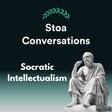
Forgive Your Enemies with Epictetus (Episode 181)
In this episode, Michael Tremblay explores Epictetus' radical approach to anger and forgiveness. Discover why the Stoics believed we should pity rather than punish those who harm us, and how this ancient wisdom offers a practical path to emotional freedom in your daily life. Through Epictetus' teachings, learn the liberating power of seeing wrongdoers as victims of their own confusion.
***
Download the Stoa app (it's a free download): https://stoameditation.com/pod
If you try the Stoa app and find it useful, but truly cannot afford it, email us and we'll set you up with a free account.
Listen to more episodes and learn more here: https://stoameditation.com/blog/stoa-conversations/
Thanks to Michael Levy for graciously letting us use his music in the conversations: https://ancientlyre.com/



















